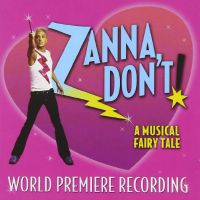 Original Off-Broadway Cast, 2003 (PS Classics)
Original Off-Broadway Cast, 2003 (PS Classics)  (2 / 5) Like the show itself, the cast recording of composer-lyricist Tim Acito’s “musical fairy tale” Zanna, Don’t! will probably appeal mainly to teenagers or early-twentysomethings with limited interest in musical theater. Anyone with more sophisticated taste will find Acito’s work unpolished and sometimes downright sloppy. His music is generally fine, a series of pop-influenced melodies well in keeping with the youthful, bouncy tone that helps sell this musical about a world where homosexuality is the dominant orientation. But Acito’s lyrics may cause fits among purists, because they’re inaccurately stressed throughout and very poorly rhymed, as in: “love/enough,” “lover/another,” “clues/you,” “this/is,” and “town/around” — all of these examples from the first song alone. Lyrical transgressions aside, Acito’s songs make for moderately enjoyable listening, with at least one — a high-school musical spoof about heterosexuals in the military, titled “Don’t Ask, Don’t Tell” — demonstrating a cleverness that’s worthy of notice. Jai Rodriguez gives an endearing performance as the title character, who’s determined to help his classmates find love, but it’s Anika Larsen’s high belting in “I Ain’t Got Time (for Nothin’ But Love)” that brings Zanna, Don’t! as close as it gets to real excitement. — Matthew Murray
(2 / 5) Like the show itself, the cast recording of composer-lyricist Tim Acito’s “musical fairy tale” Zanna, Don’t! will probably appeal mainly to teenagers or early-twentysomethings with limited interest in musical theater. Anyone with more sophisticated taste will find Acito’s work unpolished and sometimes downright sloppy. His music is generally fine, a series of pop-influenced melodies well in keeping with the youthful, bouncy tone that helps sell this musical about a world where homosexuality is the dominant orientation. But Acito’s lyrics may cause fits among purists, because they’re inaccurately stressed throughout and very poorly rhymed, as in: “love/enough,” “lover/another,” “clues/you,” “this/is,” and “town/around” — all of these examples from the first song alone. Lyrical transgressions aside, Acito’s songs make for moderately enjoyable listening, with at least one — a high-school musical spoof about heterosexuals in the military, titled “Don’t Ask, Don’t Tell” — demonstrating a cleverness that’s worthy of notice. Jai Rodriguez gives an endearing performance as the title character, who’s determined to help his classmates find love, but it’s Anika Larsen’s high belting in “I Ain’t Got Time (for Nothin’ But Love)” that brings Zanna, Don’t! as close as it gets to real excitement. — Matthew Murray
Category Archives: W-Z
Woman of the Year
 Original Broadway Cast, 1981 (Arista/Masterworks Broadway)
Original Broadway Cast, 1981 (Arista/Masterworks Broadway)  (2 / 5) This is a musicalized update of the famous Hepburn-Tracy movie of the same title, with the plot changed so that it now concerns a television anchorwoman and a cartoonist. The show is not one of composer John Kander and lyricist Fred Ebb’s better efforts. In the title role, Lauren Bacall sings in a foghorn voice that sounds far worse than it did 11 years earlier in Applause, and the star also seems overwhelmed by having too much to do. On the recording, her limitations are clear in every number — such as “When You’re Right, You’re Right,” her apology to the cartoonist (played by Harry Guardino); “One of the Boys,” in which she bonds with him and his colleagues; and “I Wrote the Book,” a pleasant ragtime number save for the fact that Bacall is singing it. Guardino’s big ballad, “Sometimes a Day Goes By,” is rather boring. Three other number delight in their negativity: “It Isn’t Working,” “I Told You So,” and “Shut Up, Gerald.” Just when the whole enterprise seems doomed, out comes Marilyn Cooper to duet with Bacall in “The Grass Is Always Greener,” a wonderful comedic showstopper and the only reason to buy this recording. — Peter Filichia
(2 / 5) This is a musicalized update of the famous Hepburn-Tracy movie of the same title, with the plot changed so that it now concerns a television anchorwoman and a cartoonist. The show is not one of composer John Kander and lyricist Fred Ebb’s better efforts. In the title role, Lauren Bacall sings in a foghorn voice that sounds far worse than it did 11 years earlier in Applause, and the star also seems overwhelmed by having too much to do. On the recording, her limitations are clear in every number — such as “When You’re Right, You’re Right,” her apology to the cartoonist (played by Harry Guardino); “One of the Boys,” in which she bonds with him and his colleagues; and “I Wrote the Book,” a pleasant ragtime number save for the fact that Bacall is singing it. Guardino’s big ballad, “Sometimes a Day Goes By,” is rather boring. Three other number delight in their negativity: “It Isn’t Working,” “I Told You So,” and “Shut Up, Gerald.” Just when the whole enterprise seems doomed, out comes Marilyn Cooper to duet with Bacall in “The Grass Is Always Greener,” a wonderful comedic showstopper and the only reason to buy this recording. — Peter Filichia
The Wizard of Oz (Arlen-Harburg-Stothart)
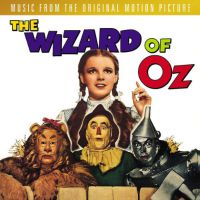 Film Soundtrack, 1939 (MGM/Rhino-Turner)
Film Soundtrack, 1939 (MGM/Rhino-Turner)  (5 / 5) Is it an overstatement to call MGM’s The Wizard of Oz the world’s most beloved film? Happily, a superb job has been done with the latest edition of the soundtrack recording of this gem, and we owe thanks to Marilee Bradford and Bradley Flanagan for doing it so neatly and completely. Many of us have fond memories of an old MGM LP of “selections from” the movie, but here we get virtually all of the music, in the best possible sound. What’s most impressive is all the musical detail that may be heard clearly for the first time. Yes, we know “Over the Rainbow” and the other great Harold Arlen-E.Y. Harburg songs performed by Judy Garland, Ray Bolger, Jack Haley, Bert Lahr, and Frank Morgan, but the background music by Herbert Stothart represents Hollywood scoring at its peak. Included on the two-CD version of the soundtrack are several other treats: multiple takes of many songs, including one of “Over the Rainbow” that comes to a premature stop with a big sneeze/cough from Garland; the song “Jitterbug,” cut from the film, but tuneful and fun to hear; and the original Buddy Ebsen recording of”If I Only Had a Heart,” made before Ebsen’s reaction to the Tin Man’s aluminum makeup forced his replacement by the far more suitable Haley. Another bonus with the two-disc set is a sumptuous booklet with rare photos and detailed notes. — Richard Barrios
(5 / 5) Is it an overstatement to call MGM’s The Wizard of Oz the world’s most beloved film? Happily, a superb job has been done with the latest edition of the soundtrack recording of this gem, and we owe thanks to Marilee Bradford and Bradley Flanagan for doing it so neatly and completely. Many of us have fond memories of an old MGM LP of “selections from” the movie, but here we get virtually all of the music, in the best possible sound. What’s most impressive is all the musical detail that may be heard clearly for the first time. Yes, we know “Over the Rainbow” and the other great Harold Arlen-E.Y. Harburg songs performed by Judy Garland, Ray Bolger, Jack Haley, Bert Lahr, and Frank Morgan, but the background music by Herbert Stothart represents Hollywood scoring at its peak. Included on the two-CD version of the soundtrack are several other treats: multiple takes of many songs, including one of “Over the Rainbow” that comes to a premature stop with a big sneeze/cough from Garland; the song “Jitterbug,” cut from the film, but tuneful and fun to hear; and the original Buddy Ebsen recording of”If I Only Had a Heart,” made before Ebsen’s reaction to the Tin Man’s aluminum makeup forced his replacement by the far more suitable Haley. Another bonus with the two-disc set is a sumptuous booklet with rare photos and detailed notes. — Richard Barrios
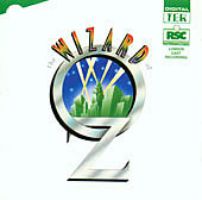 Original London Cast, 1989 (JAY)
Original London Cast, 1989 (JAY)  (2 / 5) What was more inevitable than a stage version of the extraordinarily popular MGM film The Wizard of Oz? By the 1960s, productions were cropping up everywhere; one of them even had the wonderful Margaret Hamilton reprising her definitive performance as the Wicked Witch of the West. But the most determined effort to put Oz onstage came in the 1980s, by no less a force than London’s Royal Shakespeare Company. The film’s orchestrations were recreated, its special effects adapted, and variations of this production have been performed numerous times since. The cast recording is in no way comparable to the movie soundtrack, but it’s passable. Conductor John Owen Edwards’ tempi differ from those in the movie, and while the orchestra plays well, the results are somewhat jolting. The cast varies wildly, from a sweet Dorothy (Gillian Bevan) to an undistinguished Scarecrow-Tin Man-Lion trio to a geriatric Glinda (Joyce Grant, who doubles as Aunt Em) and a literal drag of a Miss Gulch/Wicked Witch (the coyly named Bille Brown). Of course, the score itself is imperishable. — R.B.
(2 / 5) What was more inevitable than a stage version of the extraordinarily popular MGM film The Wizard of Oz? By the 1960s, productions were cropping up everywhere; one of them even had the wonderful Margaret Hamilton reprising her definitive performance as the Wicked Witch of the West. But the most determined effort to put Oz onstage came in the 1980s, by no less a force than London’s Royal Shakespeare Company. The film’s orchestrations were recreated, its special effects adapted, and variations of this production have been performed numerous times since. The cast recording is in no way comparable to the movie soundtrack, but it’s passable. Conductor John Owen Edwards’ tempi differ from those in the movie, and while the orchestra plays well, the results are somewhat jolting. The cast varies wildly, from a sweet Dorothy (Gillian Bevan) to an undistinguished Scarecrow-Tin Man-Lion trio to a geriatric Glinda (Joyce Grant, who doubles as Aunt Em) and a literal drag of a Miss Gulch/Wicked Witch (the coyly named Bille Brown). Of course, the score itself is imperishable. — R.B.
 New York Concert Cast, 1996 (Rhino-Turner)
New York Concert Cast, 1996 (Rhino-Turner)  (1 / 5) Roger Daltrey as the Tin Man? Jackson Browne as the Scarecrow? Debra Winger as Miss Gulch and the Witch? Yes indeedy, that was the casting of a televised Lincoln Center concert version of The Wizard of Oz, performed only once for charity. But this recording also gives us Nathan Lane as quite a good Cowardly Lion. Of Browne and Daltrey, it might be said that they try hard. While Winger has some fun with her devilish doings, Natalie Cole’s Glinda sounds extremely tentative. The Boys Choir of Harlem makes sweet sounds as the Munchkins, and the idea of casting Joel Grey as the Wizard was so good that it was carried forward to the Broadway musical “prequel” Wicked. Unfortunately, nothing that’s good about this recording can overcome its terminal handicap: the horrific portrayal of Dorothy by Jewel, with her unending overlay of American Idol-style swoops and gulps. Those who revere “Over the Rainbow” are officially alerted that we’re not in Kansas anymore! — R.B.
(1 / 5) Roger Daltrey as the Tin Man? Jackson Browne as the Scarecrow? Debra Winger as Miss Gulch and the Witch? Yes indeedy, that was the casting of a televised Lincoln Center concert version of The Wizard of Oz, performed only once for charity. But this recording also gives us Nathan Lane as quite a good Cowardly Lion. Of Browne and Daltrey, it might be said that they try hard. While Winger has some fun with her devilish doings, Natalie Cole’s Glinda sounds extremely tentative. The Boys Choir of Harlem makes sweet sounds as the Munchkins, and the idea of casting Joel Grey as the Wizard was so good that it was carried forward to the Broadway musical “prequel” Wicked. Unfortunately, nothing that’s good about this recording can overcome its terminal handicap: the horrific portrayal of Dorothy by Jewel, with her unending overlay of American Idol-style swoops and gulps. Those who revere “Over the Rainbow” are officially alerted that we’re not in Kansas anymore! — R.B.
 Madison Square Garden Cast, 1998 (TVT)
Madison Square Garden Cast, 1998 (TVT)  (3 / 5) This version of The Wizard of Oz was adapted from the Royal Shakespeare Company edition and an interim production by the Paper Mill Playhouse. The double role of Professor Marvel/The Wizard was taken by Mickey Rooney, who at age 78 was still a very game performer. As Miss Gulch and the Wicked Witch, Eartha Kitt has the time of her life, funneling her purring persona into this nasty pair. (Thank you, producers, for giving the bewitching Kitt the reinstated “Jitterbug” number, in which the prescient lyricist E. Y. Harburg supplied lots of “r”s to rrrrroll!) While Jessica Grové is a pleasing Dorothy and Lara Teeter a good Scarecrow, Ken Page goes a bit over the top as the Lion. Another problem is the recorded sound, reverberant and bass-ridden. This Oz may not cast the spell of the movie, but it has its own moments of magic. — R.B.
(3 / 5) This version of The Wizard of Oz was adapted from the Royal Shakespeare Company edition and an interim production by the Paper Mill Playhouse. The double role of Professor Marvel/The Wizard was taken by Mickey Rooney, who at age 78 was still a very game performer. As Miss Gulch and the Wicked Witch, Eartha Kitt has the time of her life, funneling her purring persona into this nasty pair. (Thank you, producers, for giving the bewitching Kitt the reinstated “Jitterbug” number, in which the prescient lyricist E. Y. Harburg supplied lots of “r”s to rrrrroll!) While Jessica Grové is a pleasing Dorothy and Lara Teeter a good Scarecrow, Ken Page goes a bit over the top as the Lion. Another problem is the recorded sound, reverberant and bass-ridden. This Oz may not cast the spell of the movie, but it has its own moments of magic. — R.B.
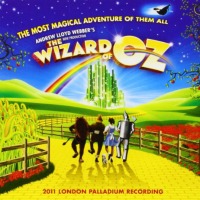 London Cast, 2011 (Verve) No stars; not recommended. If the movie posited Oz as a dream, why not a bloated stage version of The Wizard of Oz that is, in effect, a nightmare? Surely some of the impetus for this 21st century “reimagining” was the worldwide hit Wicked. Still, why take on such a cherished film, given what must be the widely held opinion — already stated here, above — that no stage production could duplicate, let alone equal, its magic or its cast? Then again, such considerations may be of lesser import to The Right Honourable Andrew, Lord Lloyd-Webber. The Wizard of the West End determined that Oz’s yellow road would benefit from some brick-gilding, which included his writing six new songs with lyrics by Tim Rice; signing the master’s own Phantom, Michael Crawford, for the title role; and casting Dorothy (Danielle Hope) by way of a televised “Over the Rainbow” talent hunt. The result opened at the London Palladium to mixed reviews, with the most praise going to the sets, costumes, and effects. Later, there would be a Toronto run and a North American tour. All involved professed their love for the original, but with synthesizer-heavy rearrangements and the unavoidable clash between 1939 and 2011 aesthetics, this show was doomed from the get-go. The offenses are many and unending: a lament for Dorothy called “Nobody Understands Me,” Miss Gulch’s original, immortal “bicycle theme” (by Herbert Stothart) being outfitted with lyrics, the deletion of “If I Were King of the Forest,” a “Red Shoe Blues” (!!) for the Witch, and much, much more. Hope is an OK Dorothy in a chirpy sort of way. Her three farmhand-turned-creature pals tend to sound alike, and Crawford manages a twee sort of authority. In summary: Remember the adage “There’s no place like home,” and stick with Garland and company. — R.B.
London Cast, 2011 (Verve) No stars; not recommended. If the movie posited Oz as a dream, why not a bloated stage version of The Wizard of Oz that is, in effect, a nightmare? Surely some of the impetus for this 21st century “reimagining” was the worldwide hit Wicked. Still, why take on such a cherished film, given what must be the widely held opinion — already stated here, above — that no stage production could duplicate, let alone equal, its magic or its cast? Then again, such considerations may be of lesser import to The Right Honourable Andrew, Lord Lloyd-Webber. The Wizard of the West End determined that Oz’s yellow road would benefit from some brick-gilding, which included his writing six new songs with lyrics by Tim Rice; signing the master’s own Phantom, Michael Crawford, for the title role; and casting Dorothy (Danielle Hope) by way of a televised “Over the Rainbow” talent hunt. The result opened at the London Palladium to mixed reviews, with the most praise going to the sets, costumes, and effects. Later, there would be a Toronto run and a North American tour. All involved professed their love for the original, but with synthesizer-heavy rearrangements and the unavoidable clash between 1939 and 2011 aesthetics, this show was doomed from the get-go. The offenses are many and unending: a lament for Dorothy called “Nobody Understands Me,” Miss Gulch’s original, immortal “bicycle theme” (by Herbert Stothart) being outfitted with lyrics, the deletion of “If I Were King of the Forest,” a “Red Shoe Blues” (!!) for the Witch, and much, much more. Hope is an OK Dorothy in a chirpy sort of way. Her three farmhand-turned-creature pals tend to sound alike, and Crawford manages a twee sort of authority. In summary: Remember the adage “There’s no place like home,” and stick with Garland and company. — R.B.
The Wizard of Oz (1903)
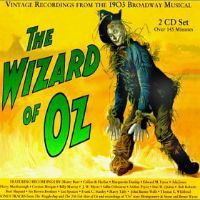 Studio Recordings, Piano Rolls, Music-Box Discs, 1903-08 (Hungry Tiger Press, 2CDs)
Studio Recordings, Piano Rolls, Music-Box Discs, 1903-08 (Hungry Tiger Press, 2CDs)  (3 / 5) Shortly after L. Frank Baum published The Wonderful Wizard of Oz, a stage musical version became the biggest hit on Broadway. Finally, a century after the show opened, a masterful CD anthology reconstituted it in audio form. Great credit is due to producer David Maxine, for whom this daunting project was obviously a labor of love: There were no cast recordings, the sheet music survived only in fragments, and the show never had a set score. Originally, Baum worked on the book and lyrics, and Paul Tietjens wrote some music for the show, but those rather halting efforts soon gave way to a never-ending batch of interpolated songs. (The name A. Baldwin Sloane, frequently cited as the composer of the show, is nowhere in evidence here.) As Maxine’s detailed notes make clear, The Wizard of Oz was topical and performer-driven, its material dropped in and removed incessantly. Among the more popular numbers were “Sammy,” “Hurrah for Baffin’s Bay,” and the cheerfully sadistic “Football.” If these titles don’t sound like they should be found on the road to Oz, the plot synopsis indicates just how little of the Baum book remained; even the Cowardly Lion was reduced to the status of a bit player. The two CDs of this set are crammed with all manner of curiosities. The bulk of them are acoustical studio recordings of the songs, but a few numbers exist solely as piano rolls or as music-box tunes. Also included are some non-Oz songs recorded by members of the original cast. Obviously, the “score” is a patchwork, and very little of it is better than mediocre, but it’s helpful that the lyrics are printed in the accompanying booklet. — Richard Barrios
(3 / 5) Shortly after L. Frank Baum published The Wonderful Wizard of Oz, a stage musical version became the biggest hit on Broadway. Finally, a century after the show opened, a masterful CD anthology reconstituted it in audio form. Great credit is due to producer David Maxine, for whom this daunting project was obviously a labor of love: There were no cast recordings, the sheet music survived only in fragments, and the show never had a set score. Originally, Baum worked on the book and lyrics, and Paul Tietjens wrote some music for the show, but those rather halting efforts soon gave way to a never-ending batch of interpolated songs. (The name A. Baldwin Sloane, frequently cited as the composer of the show, is nowhere in evidence here.) As Maxine’s detailed notes make clear, The Wizard of Oz was topical and performer-driven, its material dropped in and removed incessantly. Among the more popular numbers were “Sammy,” “Hurrah for Baffin’s Bay,” and the cheerfully sadistic “Football.” If these titles don’t sound like they should be found on the road to Oz, the plot synopsis indicates just how little of the Baum book remained; even the Cowardly Lion was reduced to the status of a bit player. The two CDs of this set are crammed with all manner of curiosities. The bulk of them are acoustical studio recordings of the songs, but a few numbers exist solely as piano rolls or as music-box tunes. Also included are some non-Oz songs recorded by members of the original cast. Obviously, the “score” is a patchwork, and very little of it is better than mediocre, but it’s helpful that the lyrics are printed in the accompanying booklet. — Richard Barrios
The Wiz
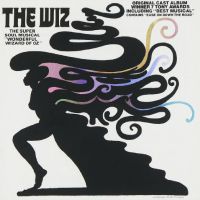 Original Broadway Cast, 1975 (Atlantic)
Original Broadway Cast, 1975 (Atlantic)  (3 / 5) L. Frank Baum hit pay dirt with The Wonderful Wizard of Oz. Two years after the novel’s publication in 1900, Baum and partners launched a musical extravaganza based on the tale; the show was a sensation, racking up hundreds of performances in New York and around the country. After countless other adaptations, including an obscure 1939 film that starred some nobody named Judy Garland, Dorothy and her pals returned to Broadway in The Wiz, an African-American musical version of the story with a brisk book by William F. Brown and fun songs by composer-lyricist Charlie Smalls. Among the very few Broadway tunes to become mainstream hits since the 1960s, this score’s infectious “Ease on Down the Road” got a lot of airplay, and Dorothy’s yearning 11-o’clock number, “Home,” put Stephanie Mills (who played the heroine) on the pop map. The Wiz enjoyed a long run and nabbed a bunch of Tony Awards, including Best Musical. Geoffrey Holder’s clever costumes and inventive direction helped turn the old tale into a fresh hit. Heard on the recording are several stellar turns in character roles: Clarice Taylor’s Addaperle (think Good Witch of the North) is a daffy, knowing delight; Tiger Haynes’s Tin Man is a smooth song-and-dance man; Hinton Battle’s Scarecrow is sweet as pie; and Ted Ross’s Lion is full of bravado. Mabel King sounds like a truly wicked witch, and her gospel-inflected “Don’t Nobody Bring Me No Bad News” proves that, for Evillene, double negatives ain’t the half of it. André De Shields is perhaps a bit too campy as the Wiz, sounding like a real friend of Dorothy. The arrangements are terrific, full of energy and Soul Train-style bounce. — Robert Sandla
(3 / 5) L. Frank Baum hit pay dirt with The Wonderful Wizard of Oz. Two years after the novel’s publication in 1900, Baum and partners launched a musical extravaganza based on the tale; the show was a sensation, racking up hundreds of performances in New York and around the country. After countless other adaptations, including an obscure 1939 film that starred some nobody named Judy Garland, Dorothy and her pals returned to Broadway in The Wiz, an African-American musical version of the story with a brisk book by William F. Brown and fun songs by composer-lyricist Charlie Smalls. Among the very few Broadway tunes to become mainstream hits since the 1960s, this score’s infectious “Ease on Down the Road” got a lot of airplay, and Dorothy’s yearning 11-o’clock number, “Home,” put Stephanie Mills (who played the heroine) on the pop map. The Wiz enjoyed a long run and nabbed a bunch of Tony Awards, including Best Musical. Geoffrey Holder’s clever costumes and inventive direction helped turn the old tale into a fresh hit. Heard on the recording are several stellar turns in character roles: Clarice Taylor’s Addaperle (think Good Witch of the North) is a daffy, knowing delight; Tiger Haynes’s Tin Man is a smooth song-and-dance man; Hinton Battle’s Scarecrow is sweet as pie; and Ted Ross’s Lion is full of bravado. Mabel King sounds like a truly wicked witch, and her gospel-inflected “Don’t Nobody Bring Me No Bad News” proves that, for Evillene, double negatives ain’t the half of it. André De Shields is perhaps a bit too campy as the Wiz, sounding like a real friend of Dorothy. The arrangements are terrific, full of energy and Soul Train-style bounce. — Robert Sandla
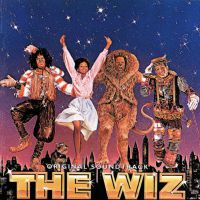 Film Soundtrack, 1978 (MCA, 2CDs)
Film Soundtrack, 1978 (MCA, 2CDs)  (1 / 5) What is it about Hollywood versions of Broadway musicals? Time and again, shows that worked onstage bomb big-time on screen. The Wiz seemed a natural for filming: It was a Tony-winning Broadway success, some of the songs had hit the pop charts, and the central concept of adapting the classic tale of The Wonderful Wizard of Oz for performance by a black cast was timely and hip. But what had been a brisk stage production was turned into a lumbering film, and the soundtrack album is better only in that you don’t have to watch the movie. The gifted Quincy Jones adapted and supervised the music, and he engaged A-talent such as Toots Thielemans, Grady Tate, and Patti Austin to work with him. But almost everything is overblown here, lacking the drive and imagination that mark Jones’s other work. Some negligible new musical material was contributed by Jones, Luther Vandross, and Ashford and Simpson. Diana Ross was too old for the role of Dorothy, and although she sings well enough on this album, she begins every song as if she’s just been on a week-long crying jag. (Cut from the movie but present on the soundtrack recording is a new ballad for Ross, “Is This What Feeling Gets?”) A young Michael Jackson is irresistible as the Scarecrow, and Nipsey Russell has an affable vaudevillian flair as the Tin Man. Ted Ross repeats his Broadway role as the Lion, but his big moments are diminished here. Richard Pryor plays the title role, and since he’s not a singer, the propulsive “So You Wanted to Meet the Wizard” is reduced to bits of woeful dialogue. On the other hand, Mabel King reprises her show-stopping stage turn as Evillene to even more hilarious effect; and the glamorous Lena Horne, in the role of Glinda, gives her all to “If You Believe.” — R.S.
(1 / 5) What is it about Hollywood versions of Broadway musicals? Time and again, shows that worked onstage bomb big-time on screen. The Wiz seemed a natural for filming: It was a Tony-winning Broadway success, some of the songs had hit the pop charts, and the central concept of adapting the classic tale of The Wonderful Wizard of Oz for performance by a black cast was timely and hip. But what had been a brisk stage production was turned into a lumbering film, and the soundtrack album is better only in that you don’t have to watch the movie. The gifted Quincy Jones adapted and supervised the music, and he engaged A-talent such as Toots Thielemans, Grady Tate, and Patti Austin to work with him. But almost everything is overblown here, lacking the drive and imagination that mark Jones’s other work. Some negligible new musical material was contributed by Jones, Luther Vandross, and Ashford and Simpson. Diana Ross was too old for the role of Dorothy, and although she sings well enough on this album, she begins every song as if she’s just been on a week-long crying jag. (Cut from the movie but present on the soundtrack recording is a new ballad for Ross, “Is This What Feeling Gets?”) A young Michael Jackson is irresistible as the Scarecrow, and Nipsey Russell has an affable vaudevillian flair as the Tin Man. Ted Ross repeats his Broadway role as the Lion, but his big moments are diminished here. Richard Pryor plays the title role, and since he’s not a singer, the propulsive “So You Wanted to Meet the Wizard” is reduced to bits of woeful dialogue. On the other hand, Mabel King reprises her show-stopping stage turn as Evillene to even more hilarious effect; and the glamorous Lena Horne, in the role of Glinda, gives her all to “If You Believe.” — R.S.
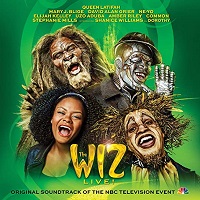 Television Cast, 2014 (Masterworks Broadway)
Television Cast, 2014 (Masterworks Broadway)  (3 / 5) This cast album is far more enjoyable on its own terms than the live television production it represents, for several reasons. The book of The Wiz has never been considered a masterpiece to begin with, but Harvey Fierstein’s heavy-handed rewrites for the TV presentation were almost all for the worse, so it’s nice to be able to enjoy this fine performance of the score without having to experience all of that — not to mention the flat direction of Kenny Leon, or the production and costume designs, which might be described as garish rather than fun and fanciful. But the most obvious way in which the audio-only experience of this Wiz satisfies far more than watching the video is that Shanice Williams’ vocal performance as Dorothy comes across so much better when not hampered by her limitations as an actress on screen, specifically her limited range of facial expressions. Only 19 years of age when The Wiz was telecast, Williams has an exceptionally beautiful and supple voice that’s lovely to hear in the sweeter moments of Dorothy’s music, and when she’s required to riff or to belt at the top of her range, it all sounds organic rather than like someone just showing off. Her rendition of “Home” is spectacular, as great a success on its own terms as that of Stephanie Mills, who happily turns up here as Aunt Em. Most everyone else in the cast does a fine job with the vocal showcases for their characters, including Elijah Kelly as the Scarecrow, Ne-Yo as the Tin-Man, David Alan Grier as the Cowardly Lion, Amber Riley as Addapearle, and Uzo Aduba as Glinda. The only exception is Queen Latifah as The Wiz, wasted in a role that makes no sense when played by a woman. And it is a disappointment that Kelly doesn’t get to sing the wonderful song originally written for the Scarecrow, “I Was Born on the Day Before Yesterday,” but instead was handed “You Can’t Win,” the far inferior number that Michael Jackson performed in the movie. It would be nice eventually to have a fully satisfying film or TV adaptation of The Wiz, but in the meantime, this cast album is an overall worthy addition to the catalog. — Michael Portantiere
(3 / 5) This cast album is far more enjoyable on its own terms than the live television production it represents, for several reasons. The book of The Wiz has never been considered a masterpiece to begin with, but Harvey Fierstein’s heavy-handed rewrites for the TV presentation were almost all for the worse, so it’s nice to be able to enjoy this fine performance of the score without having to experience all of that — not to mention the flat direction of Kenny Leon, or the production and costume designs, which might be described as garish rather than fun and fanciful. But the most obvious way in which the audio-only experience of this Wiz satisfies far more than watching the video is that Shanice Williams’ vocal performance as Dorothy comes across so much better when not hampered by her limitations as an actress on screen, specifically her limited range of facial expressions. Only 19 years of age when The Wiz was telecast, Williams has an exceptionally beautiful and supple voice that’s lovely to hear in the sweeter moments of Dorothy’s music, and when she’s required to riff or to belt at the top of her range, it all sounds organic rather than like someone just showing off. Her rendition of “Home” is spectacular, as great a success on its own terms as that of Stephanie Mills, who happily turns up here as Aunt Em. Most everyone else in the cast does a fine job with the vocal showcases for their characters, including Elijah Kelly as the Scarecrow, Ne-Yo as the Tin-Man, David Alan Grier as the Cowardly Lion, Amber Riley as Addapearle, and Uzo Aduba as Glinda. The only exception is Queen Latifah as The Wiz, wasted in a role that makes no sense when played by a woman. And it is a disappointment that Kelly doesn’t get to sing the wonderful song originally written for the Scarecrow, “I Was Born on the Day Before Yesterday,” but instead was handed “You Can’t Win,” the far inferior number that Michael Jackson performed in the movie. It would be nice eventually to have a fully satisfying film or TV adaptation of The Wiz, but in the meantime, this cast album is an overall worthy addition to the catalog. — Michael Portantiere
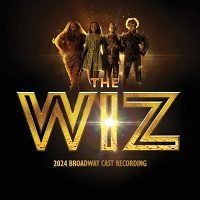 Broadway Cast, 2024 (Immersive/Interscope)
Broadway Cast, 2024 (Immersive/Interscope)  (1 / 5) The 2024 Broadway revisal of The Wiz — actually, a production that came to New York City as one stop on a U.S. national tour — was felt by some critics and audience members to be misdirected, over-produced, over-amplified, and over-sung. That last-named flaw is replicated on the cast recording. It starts out well with a new overture combining three of the score’s biggest hits: “Ease on Down the Road,” “Believe in Yourself,” and “Home.” But that track segues into another brief foretaste of “Home” with a vocal by Nichelle Lewis as Dorothy, a product of one of the oddest decisions made in regard to this production: The addition of the plot element that Dorothy is a New York City girl who has had to come live with her Aunt Em in Kansas after the death of her parents, and is very unhappy about the situation. (So then, umm, why does she sing so longingly of home when she finds herself stranded in Oz?) Once past this huge road bump, the cast album may be enjoyed by listeners who revel in or, at least, can tolerate a whole lot of vocal riffing from pretty much all of the soloists. For example, though Lewis is a major talent with a beautiful, emotionally full, expertly controlled voice, she riffs far more extensively than some listeners will feel is appropriate for the rather naïve, young Dorothy. If the weird double casting of the roles of Aunt Em and the wicked witch Evillene is another of this production’s missteps, Melody A. Betts offers distinctive vocal characterizations of each in “The Feeling We Once Had” and “Don’t Nobody Bring Me No Bad News.” Avery Wilson, Phillip Johnson Richardson, and Kyle Ramar Freeman bring charm and humor to (respectively) the Scarecrow, the Tinman, and the Lion; Freeman’s performance is more palatable here than in the show itself, because the stereotypically “gay” gestures and facial expressions he affected in the part onstage are happily absent. Though Wayne Brady doesn’t make a strong impression as The Wiz, Deborah Cox brings star quality to Glinda, who here gets to sing “He’s The Wiz” (along with Allyson Kaye Daniel as Addaperle) in addition to “Believe in Yourself” — but again, was so much riffing necessary? While some listeners may be disappointed by the replacement of the Scarecrow’s “I Was Born on the Day Before Yesterday” with “You Can’t Win” (from the film version of The Wiz), the good news is that much of the former song has been reconfigured and inserted later in the action under the new title “We’re Gonna Make It.” Also included is “Wonder, Wonder Why,” cut from the original Broadway production. (This song was previously reinstated for the 1984 revival of The Wiz, which did not yield a cast album.) Throughout the recording, the new orchestrations and arrangements by Joseph Joubert and Allen René Louis are for the most part pleasurable if sometimes a little too busy. –- M.P.
(1 / 5) The 2024 Broadway revisal of The Wiz — actually, a production that came to New York City as one stop on a U.S. national tour — was felt by some critics and audience members to be misdirected, over-produced, over-amplified, and over-sung. That last-named flaw is replicated on the cast recording. It starts out well with a new overture combining three of the score’s biggest hits: “Ease on Down the Road,” “Believe in Yourself,” and “Home.” But that track segues into another brief foretaste of “Home” with a vocal by Nichelle Lewis as Dorothy, a product of one of the oddest decisions made in regard to this production: The addition of the plot element that Dorothy is a New York City girl who has had to come live with her Aunt Em in Kansas after the death of her parents, and is very unhappy about the situation. (So then, umm, why does she sing so longingly of home when she finds herself stranded in Oz?) Once past this huge road bump, the cast album may be enjoyed by listeners who revel in or, at least, can tolerate a whole lot of vocal riffing from pretty much all of the soloists. For example, though Lewis is a major talent with a beautiful, emotionally full, expertly controlled voice, she riffs far more extensively than some listeners will feel is appropriate for the rather naïve, young Dorothy. If the weird double casting of the roles of Aunt Em and the wicked witch Evillene is another of this production’s missteps, Melody A. Betts offers distinctive vocal characterizations of each in “The Feeling We Once Had” and “Don’t Nobody Bring Me No Bad News.” Avery Wilson, Phillip Johnson Richardson, and Kyle Ramar Freeman bring charm and humor to (respectively) the Scarecrow, the Tinman, and the Lion; Freeman’s performance is more palatable here than in the show itself, because the stereotypically “gay” gestures and facial expressions he affected in the part onstage are happily absent. Though Wayne Brady doesn’t make a strong impression as The Wiz, Deborah Cox brings star quality to Glinda, who here gets to sing “He’s The Wiz” (along with Allyson Kaye Daniel as Addaperle) in addition to “Believe in Yourself” — but again, was so much riffing necessary? While some listeners may be disappointed by the replacement of the Scarecrow’s “I Was Born on the Day Before Yesterday” with “You Can’t Win” (from the film version of The Wiz), the good news is that much of the former song has been reconfigured and inserted later in the action under the new title “We’re Gonna Make It.” Also included is “Wonder, Wonder Why,” cut from the original Broadway production. (This song was previously reinstated for the 1984 revival of The Wiz, which did not yield a cast album.) Throughout the recording, the new orchestrations and arrangements by Joseph Joubert and Allen René Louis are for the most part pleasurable if sometimes a little too busy. –- M.P.
Wish You Were Here
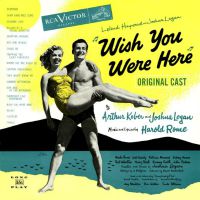 Original Broadway Cast, 1952 (RCA)
Original Broadway Cast, 1952 (RCA)  (3 / 5) Eddie Fisher’s mega-hit recording of the title tune helped turn this Catskills summer romance, based on Arthur Kober’s play Having Wonderful Time, from an almost certain flop into the biggest success of a slow season. But there’s much more to Harold Rome’s score for his first book show to reach Broadway than that repetitive rumba. The other ballads are uncommonly fine, from the intense “They Won’t Know Me” to the elegant melodic line of “Where Did the Night Go?” All of the above are lucky to be sung by Jack Cassidy; with his thrilling tenor and ardent delivery, he’s the best thing on the album. His leading lady, Patricia Marand, is technically proficient but a little stolid, and soubrette Sheila Bond hits some harsh, nasal notes, but Paul Valentine sings “Summer Afternoon” attractively. As befits a snappy musical of its period, Wish You Were Here has a steady stream of tangy comedy songs and a brassy set of Don Walker orchestrations, nicely matched by some excellent, uncredited vocal arrangements. Larry Blyden, Phyllis Newman, Florence Henderson, and Reid Shelton are in the chorus, though you probably won’t be able to pick out their voices. — Marc Miller
(3 / 5) Eddie Fisher’s mega-hit recording of the title tune helped turn this Catskills summer romance, based on Arthur Kober’s play Having Wonderful Time, from an almost certain flop into the biggest success of a slow season. But there’s much more to Harold Rome’s score for his first book show to reach Broadway than that repetitive rumba. The other ballads are uncommonly fine, from the intense “They Won’t Know Me” to the elegant melodic line of “Where Did the Night Go?” All of the above are lucky to be sung by Jack Cassidy; with his thrilling tenor and ardent delivery, he’s the best thing on the album. His leading lady, Patricia Marand, is technically proficient but a little stolid, and soubrette Sheila Bond hits some harsh, nasal notes, but Paul Valentine sings “Summer Afternoon” attractively. As befits a snappy musical of its period, Wish You Were Here has a steady stream of tangy comedy songs and a brassy set of Don Walker orchestrations, nicely matched by some excellent, uncredited vocal arrangements. Larry Blyden, Phyllis Newman, Florence Henderson, and Reid Shelton are in the chorus, though you probably won’t be able to pick out their voices. — Marc Miller
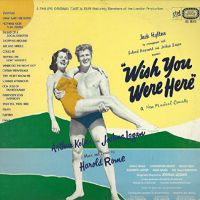 Original London Cast, 1953 (Philips/Sepia)
Original London Cast, 1953 (Philips/Sepia)  (4 / 5) London cast recordings of Broadway hits are often inferior to the originals, but this one bests its American cousin on several counts. The technical quality is superb, once you get past an echo-y overture that seems like it was lifted directly from the Broadway album. Cyril Ornadel’s musical direction is livelier than Jay Blackton’s. The musical program is almost the same, although “Goodbye, Love” is replaced by “Nothing Nicer Than People” to make the heroine more sympathetic. It’s fun to note the slight lyrical revisions that were made to suit West End audiences, such as changing “the BMT” to “the workmen’s train.” All of the Brit principals affect New York accents quite nicely, with Christopher Hewett outstanding as the unlikeliest wolf in the history of the Catskills. The rest of the London cast is inversely talented as compared to the New York company: Where Jack Cassidy was the vocal muscle of the original, his London counterpart, Bruce Trent, is uninteresting (and requires a downward modulation in “They Won’t Know Me”); but Shani Wallis is pert and more vocally secure than Sheila Bond as Fay, and Elizabeth Larner’s Teddy has the edge on Patricia Marand’s. They all sound like they’re having a whale of a summer. — M.M.
(4 / 5) London cast recordings of Broadway hits are often inferior to the originals, but this one bests its American cousin on several counts. The technical quality is superb, once you get past an echo-y overture that seems like it was lifted directly from the Broadway album. Cyril Ornadel’s musical direction is livelier than Jay Blackton’s. The musical program is almost the same, although “Goodbye, Love” is replaced by “Nothing Nicer Than People” to make the heroine more sympathetic. It’s fun to note the slight lyrical revisions that were made to suit West End audiences, such as changing “the BMT” to “the workmen’s train.” All of the Brit principals affect New York accents quite nicely, with Christopher Hewett outstanding as the unlikeliest wolf in the history of the Catskills. The rest of the London cast is inversely talented as compared to the New York company: Where Jack Cassidy was the vocal muscle of the original, his London counterpart, Bruce Trent, is uninteresting (and requires a downward modulation in “They Won’t Know Me”); but Shani Wallis is pert and more vocally secure than Sheila Bond as Fay, and Elizabeth Larner’s Teddy has the edge on Patricia Marand’s. They all sound like they’re having a whale of a summer. — M.M.
Wings
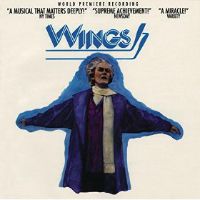 Original Cast Members, 1995 (RCA)
Original Cast Members, 1995 (RCA)  (3 / 5) Composer Jeffrey Lunden and lyricist-librettist Arthur Perlman deserve credit for tackling such difficult source material: Arthur Kopit’s acclaimed play Wings, about a former aviatrix and stunt pilot who’s recovering from a stroke. Their score for the musical is complex and multi-layered; if it doesn’t quite reach the skies, it doesn’t crash, either. Much of the music is exquisite, but the style of the score is more like a chamber opera. There’s very little in the way of “numbers,” some of the vocal lines are curious, and the lyrics often eschew rhyme. However, there is one song that’s likely to please those looking for an old-fashioned melody: “A Recipe for Cheesecake,” here sung by Russ Thacker, the only performer on the album who wasn’t in the stage production. It’s as close to a “show tune” as Wings gets. The strange noises you’ll hear at several points during the recording are part of a complex melding of sound design (Richard Woodbury) and orchestration (Lunden), designed to simulate the scary world inside the head of the central character, played by Linda Stephens. Recorded several years after Wings premiered at Chicago’s Goodman Theatre and then moved to New York’s Public Theater, this one-disc album contains nearly the entire show, dialogue and all. It was superbly produced by Thomas Z. Shepard; listen through headphones for the full effect. — Seth Christenfeld
(3 / 5) Composer Jeffrey Lunden and lyricist-librettist Arthur Perlman deserve credit for tackling such difficult source material: Arthur Kopit’s acclaimed play Wings, about a former aviatrix and stunt pilot who’s recovering from a stroke. Their score for the musical is complex and multi-layered; if it doesn’t quite reach the skies, it doesn’t crash, either. Much of the music is exquisite, but the style of the score is more like a chamber opera. There’s very little in the way of “numbers,” some of the vocal lines are curious, and the lyrics often eschew rhyme. However, there is one song that’s likely to please those looking for an old-fashioned melody: “A Recipe for Cheesecake,” here sung by Russ Thacker, the only performer on the album who wasn’t in the stage production. It’s as close to a “show tune” as Wings gets. The strange noises you’ll hear at several points during the recording are part of a complex melding of sound design (Richard Woodbury) and orchestration (Lunden), designed to simulate the scary world inside the head of the central character, played by Linda Stephens. Recorded several years after Wings premiered at Chicago’s Goodman Theatre and then moved to New York’s Public Theater, this one-disc album contains nearly the entire show, dialogue and all. It was superbly produced by Thomas Z. Shepard; listen through headphones for the full effect. — Seth Christenfeld
Windy City
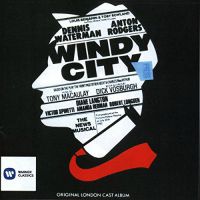 Original London Cast, 1982 (EMI/Ange1)
Original London Cast, 1982 (EMI/Ange1)  (3 / 5) Much of Tony Macaulay’s music is too pop-rocky for an adaptation of the classic 1920s Ben Hecht-Charles MacArthur comedy The Front Page, but Macaulay and the gifted lyricist Dick Vosburgh created many songs for Windy City that are terrific in their own right, so the show scores on this recording in a way that it never did onstage. The story of ace newspaper reporter Hildy Johnson (played by Dennis Waterman) wanting to abandon his boss Walter Burns (played by Anton Rodgers) for marriage and a different career is outfitted by Macaulay and Vosburgh with several intoxicating numbers (“Hey, Hallelujah,” “I Can Just Imagine It,” and the title song), some lovely ballads (“Wait Till I Get You on Your Own,” “Long Night Again Tonight”), and only a couple of clunkers (“Waltz for Mollie,” “Bensinger’s Poem”). When the chorines sing “Saturday,” which does sound like a 1920s tune, it reminds us how out-of-period the other songs are. Still, “Water Under the Bridge” is a terrific 11-o’clock number and would be a great audition song for strong leading men. — Peter Filichia
(3 / 5) Much of Tony Macaulay’s music is too pop-rocky for an adaptation of the classic 1920s Ben Hecht-Charles MacArthur comedy The Front Page, but Macaulay and the gifted lyricist Dick Vosburgh created many songs for Windy City that are terrific in their own right, so the show scores on this recording in a way that it never did onstage. The story of ace newspaper reporter Hildy Johnson (played by Dennis Waterman) wanting to abandon his boss Walter Burns (played by Anton Rodgers) for marriage and a different career is outfitted by Macaulay and Vosburgh with several intoxicating numbers (“Hey, Hallelujah,” “I Can Just Imagine It,” and the title song), some lovely ballads (“Wait Till I Get You on Your Own,” “Long Night Again Tonight”), and only a couple of clunkers (“Waltz for Mollie,” “Bensinger’s Poem”). When the chorines sing “Saturday,” which does sound like a 1920s tune, it reminds us how out-of-period the other songs are. Still, “Water Under the Bridge” is a terrific 11-o’clock number and would be a great audition song for strong leading men. — Peter Filichia
The Will Rogers Follies
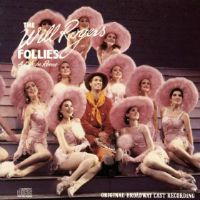 Original Broadway Cast, 1991 (Sony)
Original Broadway Cast, 1991 (Sony)  (3 / 5) Chameleonic composer Cy Coleman and stalwart Broadway lyricists Betty Comden and Adolph Green wrote the songs for The Will Rogers Follies, a fanciful musical biography of the populist humorist as might have been concocted by Florenz Ziegfeld, in whose revues Rogers made numerous appearances. Coleman combines country twang and Broadway know-how in his music (evocatively orchestrated by Bill Byers), and the Camden-Green lyrics are bright and clever. If the score isn’t of first-tier quality, it’s better than just utilitarian; but it’s hard to tell that from the cast recording, a rather lackluster audio presentation of a show that burst with life under Tommy Tune’s direction. The cast certainly isn’t to blame: Keith Carradine is ingratiating as Rogers, Dee Hoty’s velvet voice brings Will’s wife Berry to warm-hearted life, and future Tony Awards winners Dick Latessa and Cady Huffman find great charm and humor in their supporting roles. But the score, separated from the energy of Tune’s direction/choreography and Peter Stone’s book, is less than wholly effective on its own. The dynamic production numbers “Will-a-Mania” and “Our Favorite Son” suffer the most, but even the major solo turns — Carradine’s “I Never Met a Man I Didn’t Like” and Hoty’s show-stopping “No Man Left for Me” — are somewhat disappointing here. Still, the music’s attractiveness and the performers’ abundant talents save the day, making a weak representation of the show still well worth a listen or three. — Matthew Murray
(3 / 5) Chameleonic composer Cy Coleman and stalwart Broadway lyricists Betty Comden and Adolph Green wrote the songs for The Will Rogers Follies, a fanciful musical biography of the populist humorist as might have been concocted by Florenz Ziegfeld, in whose revues Rogers made numerous appearances. Coleman combines country twang and Broadway know-how in his music (evocatively orchestrated by Bill Byers), and the Camden-Green lyrics are bright and clever. If the score isn’t of first-tier quality, it’s better than just utilitarian; but it’s hard to tell that from the cast recording, a rather lackluster audio presentation of a show that burst with life under Tommy Tune’s direction. The cast certainly isn’t to blame: Keith Carradine is ingratiating as Rogers, Dee Hoty’s velvet voice brings Will’s wife Berry to warm-hearted life, and future Tony Awards winners Dick Latessa and Cady Huffman find great charm and humor in their supporting roles. But the score, separated from the energy of Tune’s direction/choreography and Peter Stone’s book, is less than wholly effective on its own. The dynamic production numbers “Will-a-Mania” and “Our Favorite Son” suffer the most, but even the major solo turns — Carradine’s “I Never Met a Man I Didn’t Like” and Hoty’s show-stopping “No Man Left for Me” — are somewhat disappointing here. Still, the music’s attractiveness and the performers’ abundant talents save the day, making a weak representation of the show still well worth a listen or three. — Matthew Murray
The Wild Party (Lippa)
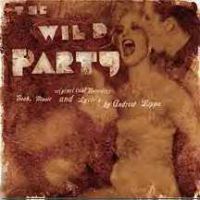 Original Off-Broadway Cast, 2000 (RCA)
Original Off-Broadway Cast, 2000 (RCA)  (4 / 5) This was the first of the entries in the 2000 competition between two stage musical adaptations of Joseph Moncure March’s epic poem. Although Andrew Lippa is a talented musical dramatist, his lyrics aren’t always perfect here (he employs a lot of metaphors that don’t make any sense), and the pop-rock influence in his music is rarely accurate to the period. Still, the overall effect of the Manhattan Theatre Club production was dazzling. Unfortunately, the cast album doesn’t fully indicate how brilliant the piece was onstage. For one thing, the nearly through-sung score was chopped down to 73 minutes of “highlights,” leaving out a great deal of interesting material. Also, the album was made shortly after the show closed, when its astounding leading lady, the previously unknown Julia Murney, wasn’t in her best voice. Murney still belts the score to high heaven, but not quite as high as she did in the theater. The other excellent leads are Brian d’Arcy James, Idina Menzel, and Taye Diggs, and there are terrific supporting performances by Alix Korey (who delivers the hilarious “Old-Fashioned Love Story”), Raymond Jaramillo McLeod, and Jennifer Cody. Even with the above caveats, this recording is still a fantastic listen; among the highlights are “Raise the Roof,” “A Wild, Wild Party,” “Queenie Was a Blonde,” “Poor Child,” and “Make Me Happy.” — Seth Christenfeld
(4 / 5) This was the first of the entries in the 2000 competition between two stage musical adaptations of Joseph Moncure March’s epic poem. Although Andrew Lippa is a talented musical dramatist, his lyrics aren’t always perfect here (he employs a lot of metaphors that don’t make any sense), and the pop-rock influence in his music is rarely accurate to the period. Still, the overall effect of the Manhattan Theatre Club production was dazzling. Unfortunately, the cast album doesn’t fully indicate how brilliant the piece was onstage. For one thing, the nearly through-sung score was chopped down to 73 minutes of “highlights,” leaving out a great deal of interesting material. Also, the album was made shortly after the show closed, when its astounding leading lady, the previously unknown Julia Murney, wasn’t in her best voice. Murney still belts the score to high heaven, but not quite as high as she did in the theater. The other excellent leads are Brian d’Arcy James, Idina Menzel, and Taye Diggs, and there are terrific supporting performances by Alix Korey (who delivers the hilarious “Old-Fashioned Love Story”), Raymond Jaramillo McLeod, and Jennifer Cody. Even with the above caveats, this recording is still a fantastic listen; among the highlights are “Raise the Roof,” “A Wild, Wild Party,” “Queenie Was a Blonde,” “Poor Child,” and “Make Me Happy.” — Seth Christenfeld
The Wild Party (LaChiusa)
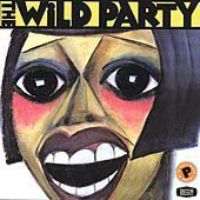 Original Broadway Cast, 2000 (Decca)
Original Broadway Cast, 2000 (Decca)  (5 / 5) Composer-lyricist Michael John LaChiusa was not unknown when The Wild Party, his adaptation of Joseph Moncure March’s 1928 poem of the same title, hit Broadway in 2000; but he truly laid his claim as a major force in the musical theater with this work, among the most dazzling of the “postmodern” school. The cast album is dynamic, a thrilling document of one of the most stirring theater scores of the late 20th century. LaChiusa’s songs are heavily steeped in period jazz and vaudeville styles (aided by Todd Ellison’s flawless musical direction and Bruce Coughlin’s searing orchestrations) while still sounding thoroughly modern and fresh. Beginning with a startlingly dissonant horn blast, the delights of the recording don’t stop. Consider the raunchy “Queenie Was a Blonde,” the rip-roaring “Uptown Downtown,” the torchy “Lowdown-Down,” the bathtub-gin-infused “Wild,” the bluesy “Black Is a Moocher,” the lost-in-life lovers’ duet “People Like Us,” and the 11-o’clock showstopper “When It Ends.” That last number is delivered titanically by the legendary Eartha Kitt, but the whole cast is excellent. Leading the way are Toni Collette, sounding like a veteran in her Broadway debut as the bleached-blonde chorine Queenie, and Mandy Patinkin as her manic and violent lover, Burrs. They receive top-notch support from Marc Kudisch, Tonya Pinkins, Norm Lewis, Brooke Sunny Moriber, Yancey Arias, and other distinctive performers. Although this is not a complete document of the score, there’s a lot packed into the recording’s 78 minutes. — Matthew Murray
(5 / 5) Composer-lyricist Michael John LaChiusa was not unknown when The Wild Party, his adaptation of Joseph Moncure March’s 1928 poem of the same title, hit Broadway in 2000; but he truly laid his claim as a major force in the musical theater with this work, among the most dazzling of the “postmodern” school. The cast album is dynamic, a thrilling document of one of the most stirring theater scores of the late 20th century. LaChiusa’s songs are heavily steeped in period jazz and vaudeville styles (aided by Todd Ellison’s flawless musical direction and Bruce Coughlin’s searing orchestrations) while still sounding thoroughly modern and fresh. Beginning with a startlingly dissonant horn blast, the delights of the recording don’t stop. Consider the raunchy “Queenie Was a Blonde,” the rip-roaring “Uptown Downtown,” the torchy “Lowdown-Down,” the bathtub-gin-infused “Wild,” the bluesy “Black Is a Moocher,” the lost-in-life lovers’ duet “People Like Us,” and the 11-o’clock showstopper “When It Ends.” That last number is delivered titanically by the legendary Eartha Kitt, but the whole cast is excellent. Leading the way are Toni Collette, sounding like a veteran in her Broadway debut as the bleached-blonde chorine Queenie, and Mandy Patinkin as her manic and violent lover, Burrs. They receive top-notch support from Marc Kudisch, Tonya Pinkins, Norm Lewis, Brooke Sunny Moriber, Yancey Arias, and other distinctive performers. Although this is not a complete document of the score, there’s a lot packed into the recording’s 78 minutes. — Matthew Murray
Wildcat
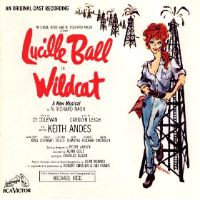 Original Broadway Cast, 1961 (RCA)
Original Broadway Cast, 1961 (RCA)  (2 / 5) Why did the star of Wildcat choose to make her Broadway debut in a show with requirements so far afield from her abilities? Lucille Ball had looks and charisma and great comic timing, but this was a musical, and its leading lady couldn’t sing; all those I Love Lucy jokes about her tin-eared vocalizing were not exaggerations. The show itself is all right, sort of a female Music Man of the oil fields with a synthetic book by N. Richard Nash and a bouncy score by composer Cy Coleman and lyricist Carolyn Leigh. “Hey, Look Me Over” was the hit of the score, but “What Takes My Fancy” and some of the other tunes are also nice. The whole company sounds energetic on the disc, and the male lead, Keith Andes, handles his music very well. Although the recording can’t convey the inventiveness of Michael Kidd’s choreography, it does hint at the gusto with which Ball threw herself into her song-and-dance numbers. Wildcat would have run longer on Ball’s name alone had she not become exhausted with the grind of eight performances a week, but the show is not compelling enough to have ever entered the arena of perennial showcase musicals. — Richard Barrios
(2 / 5) Why did the star of Wildcat choose to make her Broadway debut in a show with requirements so far afield from her abilities? Lucille Ball had looks and charisma and great comic timing, but this was a musical, and its leading lady couldn’t sing; all those I Love Lucy jokes about her tin-eared vocalizing were not exaggerations. The show itself is all right, sort of a female Music Man of the oil fields with a synthetic book by N. Richard Nash and a bouncy score by composer Cy Coleman and lyricist Carolyn Leigh. “Hey, Look Me Over” was the hit of the score, but “What Takes My Fancy” and some of the other tunes are also nice. The whole company sounds energetic on the disc, and the male lead, Keith Andes, handles his music very well. Although the recording can’t convey the inventiveness of Michael Kidd’s choreography, it does hint at the gusto with which Ball threw herself into her song-and-dance numbers. Wildcat would have run longer on Ball’s name alone had she not become exhausted with the grind of eight performances a week, but the show is not compelling enough to have ever entered the arena of perennial showcase musicals. — Richard Barrios
Wicked
 Original Broadway Cast, 2003 (Decca)
Original Broadway Cast, 2003 (Decca)  (4 / 5) Don’t go to this recording for a perfectly accurate representation of what’s heard in the theater; the songs were somewhat edited for the cast album to remove any hint of the twisty plot of Wicked, a musical based on Gregory Maguire’s novel, which purports to tell the true story of the “good” and “bad” witches immortalized in L. Frank Baum’s The Wizard of Oz. Still, this is one of Stephen Schwartz’s best scores — an unpopular opinion, admittedly! — and the excellent album boasts more than an hour of knockout songs, terrific high belting courtesy of stars Idina Menzel (Elphaba) and Kristin Chenoweth (Galinda/Glinda), and a fantastic-sounding orchestra conducted by Stephen Oremus. Listen particularly to Menzel’s astounding performances of “The Wizard and I,” “I’m Not That Girl,” “No Good Deed,” “Defying Gravity,” and her two gorgeous duets, “As Long as You’re Mine” (with Norbert Leo Butz as Fiyero) and “For Good” (with Chenoweth). Also pay special attention to William David Brohn’s great orchestrations in a pop-rock idiom that’s unusual for him. Unfortunately, very little of Winnie Holtzman’s adept libretto is included on the disc; the absence of dialogue leaves the estimable supporting performers Carole Shelley, Joel Grey, Christopher Fitzgerald, and Michelle Federer in the lurch. — Seth Christenfeld
(4 / 5) Don’t go to this recording for a perfectly accurate representation of what’s heard in the theater; the songs were somewhat edited for the cast album to remove any hint of the twisty plot of Wicked, a musical based on Gregory Maguire’s novel, which purports to tell the true story of the “good” and “bad” witches immortalized in L. Frank Baum’s The Wizard of Oz. Still, this is one of Stephen Schwartz’s best scores — an unpopular opinion, admittedly! — and the excellent album boasts more than an hour of knockout songs, terrific high belting courtesy of stars Idina Menzel (Elphaba) and Kristin Chenoweth (Galinda/Glinda), and a fantastic-sounding orchestra conducted by Stephen Oremus. Listen particularly to Menzel’s astounding performances of “The Wizard and I,” “I’m Not That Girl,” “No Good Deed,” “Defying Gravity,” and her two gorgeous duets, “As Long as You’re Mine” (with Norbert Leo Butz as Fiyero) and “For Good” (with Chenoweth). Also pay special attention to William David Brohn’s great orchestrations in a pop-rock idiom that’s unusual for him. Unfortunately, very little of Winnie Holtzman’s adept libretto is included on the disc; the absence of dialogue leaves the estimable supporting performers Carole Shelley, Joel Grey, Christopher Fitzgerald, and Michelle Federer in the lurch. — Seth Christenfeld
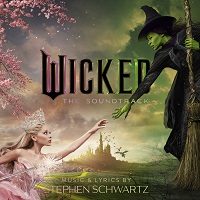 Motion Picture Soundtrack, 2024 (Universal Studios and Republic Records)
Motion Picture Soundtrack, 2024 (Universal Studios and Republic Records)  (3.5 / 5) With its extraordinary level of hype and an unprecedented two-part release, the motion picture adaptation of Stephen Schwartz and Winnie Holzman’s Wicked had a lot to live up to. But fans of the stage musical can breathe a sigh of relief: Wicked Part One is two hours and 40 minutes of nonstop entertainment. Much of its charm comes from its plethora of visual effects, so in that sense, this version is better seen than heard. However, credit where credit is due: The casting of Tony Award winner Cynthia Erivo as Elphaba ensured that the character’s songs would really get the chance to fly. As heard in the movie and on the soundtrack album, Erivo’s “Defying Gravity” knocked this reviewer’s socks off, and her rendition of “I’m Not That Girl” is softly thrilling. Part One of Wicked remains faithful to the stage musical by including the entire score heard in the show’s first act, including a few songs that might have been skipped, such as “A Sentimental Man” and “Something Bad.” The latter is, in fact, quite effective in a deeply felt performance by Peter Dinklage as Doctor Dillamond. If Jeff Goldblum as The Wizard and Michelle Yeoh as Madame Morrible aren’t quite up to their tasks vocally, their performances do not significantly hinder the listening experience. While Erivo’s Elphaba is staggeringly original, casting aside the inevitable ghost of Idina Menzel (who makes a charming cameo appearance here), Ariana Grande as Glinda finds the perfect balance between echoes of Kristin Chenoweth (also given a cameo in the film and on the album) and her own unique charm and humor; one can only hope that this performance is the first of many starring roles in musicals for her. Jonathan Bailey, who began his career as a West End musical theater actor, is smooth as butter in “Dancing Through Life,” even if the song’s extended instrumental sequences only really make sense with the movie’s visuals. This album does suffer from some of the aural artificiality heard in many soundtracks, but the orchestrations are lush, notably in the “Ozdust Duet.” While the recording lacks some of the raw power present on the original Broadway cast album, it’s an excellent representation of the score and a consistently delightful listen. — Charles Kirsch
(3.5 / 5) With its extraordinary level of hype and an unprecedented two-part release, the motion picture adaptation of Stephen Schwartz and Winnie Holzman’s Wicked had a lot to live up to. But fans of the stage musical can breathe a sigh of relief: Wicked Part One is two hours and 40 minutes of nonstop entertainment. Much of its charm comes from its plethora of visual effects, so in that sense, this version is better seen than heard. However, credit where credit is due: The casting of Tony Award winner Cynthia Erivo as Elphaba ensured that the character’s songs would really get the chance to fly. As heard in the movie and on the soundtrack album, Erivo’s “Defying Gravity” knocked this reviewer’s socks off, and her rendition of “I’m Not That Girl” is softly thrilling. Part One of Wicked remains faithful to the stage musical by including the entire score heard in the show’s first act, including a few songs that might have been skipped, such as “A Sentimental Man” and “Something Bad.” The latter is, in fact, quite effective in a deeply felt performance by Peter Dinklage as Doctor Dillamond. If Jeff Goldblum as The Wizard and Michelle Yeoh as Madame Morrible aren’t quite up to their tasks vocally, their performances do not significantly hinder the listening experience. While Erivo’s Elphaba is staggeringly original, casting aside the inevitable ghost of Idina Menzel (who makes a charming cameo appearance here), Ariana Grande as Glinda finds the perfect balance between echoes of Kristin Chenoweth (also given a cameo in the film and on the album) and her own unique charm and humor; one can only hope that this performance is the first of many starring roles in musicals for her. Jonathan Bailey, who began his career as a West End musical theater actor, is smooth as butter in “Dancing Through Life,” even if the song’s extended instrumental sequences only really make sense with the movie’s visuals. This album does suffer from some of the aural artificiality heard in many soundtracks, but the orchestrations are lush, notably in the “Ozdust Duet.” While the recording lacks some of the raw power present on the original Broadway cast album, it’s an excellent representation of the score and a consistently delightful listen. — Charles Kirsch
Whoop-Up
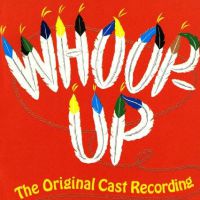 Original Broadway Cast, 1958 (MGM/Polydor)
Original Broadway Cast, 1958 (MGM/Polydor)  (2 / 5) With music by Moose Charlap and lyrics by Norman Gimbel, Whoop-Up was a quick failure set in a Montana bar (“where you don’t have to wear a tie to tie one on,” goes one of the forced lyrics). You’ll shake your head in amazement at such songs as “Nobody Throw That Bull,” “‘Caress Me, Possess Me’ Perfume,” “The Best of What This Country’s Got (Was Taken From the Indians),” “I Wash My Hands,” and “Montana,” which will never become that state’s official song. Susan Johnson has the strangest piece of material: “Men,” in which she speak-sings nearly three minutes’ worth of complaints about the male gender as a Dixieland melody plays underneath. The love songs, including the saccharine “Never Before,” are no better. Particularly bizarre is “Love Eyes,” sung by Ralph Young. (Sample lyric: “Your lipstick’s wet and waitin’ for my smear.”) That there were cover versions of some of these songs would be hard to believe if the CD reissue hadn’t included quite a few of them. Jazz pianist Dick Hyman’s two cuts are bewitching; they prove that composer Charlap did come up with some fetching melodies for this score. — Peter Filichia
(2 / 5) With music by Moose Charlap and lyrics by Norman Gimbel, Whoop-Up was a quick failure set in a Montana bar (“where you don’t have to wear a tie to tie one on,” goes one of the forced lyrics). You’ll shake your head in amazement at such songs as “Nobody Throw That Bull,” “‘Caress Me, Possess Me’ Perfume,” “The Best of What This Country’s Got (Was Taken From the Indians),” “I Wash My Hands,” and “Montana,” which will never become that state’s official song. Susan Johnson has the strangest piece of material: “Men,” in which she speak-sings nearly three minutes’ worth of complaints about the male gender as a Dixieland melody plays underneath. The love songs, including the saccharine “Never Before,” are no better. Particularly bizarre is “Love Eyes,” sung by Ralph Young. (Sample lyric: “Your lipstick’s wet and waitin’ for my smear.”) That there were cover versions of some of these songs would be hard to believe if the CD reissue hadn’t included quite a few of them. Jazz pianist Dick Hyman’s two cuts are bewitching; they prove that composer Charlap did come up with some fetching melodies for this score. — Peter Filichia
A White House Cantata (1600 Pennsylvania Avenue)
 Studio Cast, 1998 (Deutsche Grammophon)
Studio Cast, 1998 (Deutsche Grammophon)  (1 / 5) The recording of a previously unrecorded musical theater score is usually a cause for celebration, but A White House Cantata is a maddening misfire. The 1976 Broadway flop 1600 Pennsylvania Avenue deserves better than this, not least because its score was written by luminaries Leonard Bernstein and Alan Jay Lerner. Many of their compositions for the show, which concerns race relations in 19th-century America, are of epic sweep, but in this cantata drawn from the score of the musical, they’re hurt by the style of presentation. From a purely vocal standpoint, the cast is fine: Thomas Hampson and June Anderson sumptuously sing the music of all of the presidents and first ladies, while Barbara Hendricks and Kenneth Tarver are more than capable as their black servants. But the renditions of most of the songs are overwrought and lacking in character and color; this is especially evident in “Duet for One,” in which two first ladies duke it out in song. The choral numbers are rich and full, the orchestra (conducted by Kent Nagano) is beyond reproach, and a good amount of material that was lost during the show’s tumultuous preview period has been restored. A White House Cantata is not a total loss, but the lack of theatrical verve makes this recording a poor representation of 1600 Pennsylvania Avenue as a theater piece. — Matthew Murray
(1 / 5) The recording of a previously unrecorded musical theater score is usually a cause for celebration, but A White House Cantata is a maddening misfire. The 1976 Broadway flop 1600 Pennsylvania Avenue deserves better than this, not least because its score was written by luminaries Leonard Bernstein and Alan Jay Lerner. Many of their compositions for the show, which concerns race relations in 19th-century America, are of epic sweep, but in this cantata drawn from the score of the musical, they’re hurt by the style of presentation. From a purely vocal standpoint, the cast is fine: Thomas Hampson and June Anderson sumptuously sing the music of all of the presidents and first ladies, while Barbara Hendricks and Kenneth Tarver are more than capable as their black servants. But the renditions of most of the songs are overwrought and lacking in character and color; this is especially evident in “Duet for One,” in which two first ladies duke it out in song. The choral numbers are rich and full, the orchestra (conducted by Kent Nagano) is beyond reproach, and a good amount of material that was lost during the show’s tumultuous preview period has been restored. A White House Cantata is not a total loss, but the lack of theatrical verve makes this recording a poor representation of 1600 Pennsylvania Avenue as a theater piece. — Matthew Murray
Whistle Down the Wind
 Studio Cast, 1998 (Polydor)
Studio Cast, 1998 (Polydor)  (2 / 5) Labeled Songs from Whistle Down the Wind, this collection of 12 numbers performed by a lineup of pop stars is easier to take than the subsequent London stage cast recording of this Andrew Lloyd Webber score. Divorced from the show’s ludicrous story line (detailed below) and arranged as the disposable pop artifacts they really are, the songs actually provide some enjoyment. Tom Jones, aided by Sounds of Blackness, offers a soulful “Vaults of Heaven.” The boy band Boyzone does right by the repetitive “No Matter What,” and Donny Osmond proves to be the ideal interpreter of “When Children Rule the World.” Also on hand are Elaine Paige, Meat Loaf, Boy George, Bonnie Tyler, and Michael Ball. It’s a relatively painless way to enjoy the modest pleasures of a misbegotten show. — David Barbour
(2 / 5) Labeled Songs from Whistle Down the Wind, this collection of 12 numbers performed by a lineup of pop stars is easier to take than the subsequent London stage cast recording of this Andrew Lloyd Webber score. Divorced from the show’s ludicrous story line (detailed below) and arranged as the disposable pop artifacts they really are, the songs actually provide some enjoyment. Tom Jones, aided by Sounds of Blackness, offers a soulful “Vaults of Heaven.” The boy band Boyzone does right by the repetitive “No Matter What,” and Donny Osmond proves to be the ideal interpreter of “When Children Rule the World.” Also on hand are Elaine Paige, Meat Loaf, Boy George, Bonnie Tyler, and Michael Ball. It’s a relatively painless way to enjoy the modest pleasures of a misbegotten show. — David Barbour
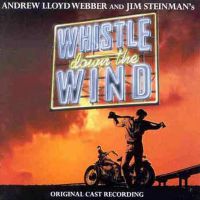 Original London Cast, 1999 (Really Useful Records)
Original London Cast, 1999 (Really Useful Records)  (1 / 5) This egregious Andrew Lloyd Webber musical, based on a novel by Mary Hayley Bell and a subsequent screenplay by Keith Waterhouse and Willis Hall, is about a group of poor children in rural England who mistake an escaped murderer for Jesus Christ. Told with restraint, it could have been a moving tale. Unfortunately, a committee of librettists — Patricia Knopf, director Gale Edwards, and Lloyd Webber himself — made the disastrous decision to reset the action in the American South during the 1950s. The show begins with one of the composer’s finest songs, the gospel tune “Vaults of Heaven,” but the score quickly turns into an unpalatable mixture of sticky sentiment and violent melodrama. Catchy tunes are often laughably unsuited to the onstage action, and matters aren’t helped by Jim Steinman’s clunky lyrics. The songwriters’ try-anything approach includes a pair of faux Brecht-Weill items, “Annie Christmas” and “Charlie Christmas,” plus the unbearably cute “When Children Rule the World” and the ridiculous “A Kiss Is a Terrible Thing to Waste.” The nadir is “Tire Tracks and Broken Hearts,” which recycles the melody of “English Girls” from Lloyd Webber’s Song & Dance. As the simple young waif Swallow and the escaped convict whom she believes is her Savior, Dottie Mayor and Marcus Lovett provide plenty of vocal emoting, but the songs are further sabotaged by the vulgar orchestrations of David Cullen and the composer. — D.B.
(1 / 5) This egregious Andrew Lloyd Webber musical, based on a novel by Mary Hayley Bell and a subsequent screenplay by Keith Waterhouse and Willis Hall, is about a group of poor children in rural England who mistake an escaped murderer for Jesus Christ. Told with restraint, it could have been a moving tale. Unfortunately, a committee of librettists — Patricia Knopf, director Gale Edwards, and Lloyd Webber himself — made the disastrous decision to reset the action in the American South during the 1950s. The show begins with one of the composer’s finest songs, the gospel tune “Vaults of Heaven,” but the score quickly turns into an unpalatable mixture of sticky sentiment and violent melodrama. Catchy tunes are often laughably unsuited to the onstage action, and matters aren’t helped by Jim Steinman’s clunky lyrics. The songwriters’ try-anything approach includes a pair of faux Brecht-Weill items, “Annie Christmas” and “Charlie Christmas,” plus the unbearably cute “When Children Rule the World” and the ridiculous “A Kiss Is a Terrible Thing to Waste.” The nadir is “Tire Tracks and Broken Hearts,” which recycles the melody of “English Girls” from Lloyd Webber’s Song & Dance. As the simple young waif Swallow and the escaped convict whom she believes is her Savior, Dottie Mayor and Marcus Lovett provide plenty of vocal emoting, but the songs are further sabotaged by the vulgar orchestrations of David Cullen and the composer. — D.B.
Where’s Charley?
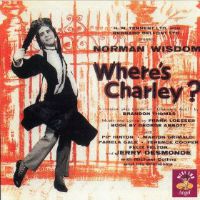 Original London Cast, 1958 (Columbia/Angel)
Original London Cast, 1958 (Columbia/Angel)  (4 / 5) Based on Charley’s Aunt, the reliable old farce by Brandon Thomas, Where’s Charley? was a big hit on Broadway in 1948 with Ray Bolger in the lead. But the show didn’t yield an original cast album, apparently due to a musicians’ strike; nor has there ever been a commercially released soundtrack album drawn from the obscure 1952 film version, in which Bolger recreated his stage role of Charley Wykeham. Fortunately, the 1958 London production yielded a good recording of the delightful score by composer-lyricist Frank Loesser. British stage and film comedian Norman Wisdom may not have had quite the same type of high-wattage comic energy that Bolger possessed, but he was much better suited to the part of Charley in terms of accent and singing ability, and his performance here is ingratiating. The supporting cast is generally fine: Pip Hinton is adorable as Amy Spettigue, while Pamela Gale and Marion Grimaldi sing beautifully as (respectively) Kitty Verdun and Donna Lucia d’Alvadorez. Felix Felton is very funny as Mr. Spettigue, who has no idea that Charley’s aunt — the woman he’s wooing for her money — is actually Charley in drag. The one inadequate performance on the album comes from Terence Cooper, who exhibits an unattractive, throaty singing voice as Jack Chesney. “Once in Love With Amy” is the show’s big hit, but the score is chockablock with skillfully crafted charm songs and comedy numbers (“Better Get Out of Here,” “The Woman in His Room”) and beautiful love ballads (“My Darling, My Darling,” “Lovelier Than Ever,” “At the Red Rose Cotillion”). Disappointingly, only a fragment of the title song is included on this recording; a lengthy ensemble number as written, it’s here reduced to one brief chorus introduced by Wisdom’s quotation of the show’s most famous line of dialogue: “I am Charley’s aunt from Brazil — where the nuts come from!” The album would be essential if only because it’s the sole recording of a fine Loesser score, so it’s good news that the performance is so praiseworthy overall, and that the early stereo sound is excellent. — Michael Portantiere
(4 / 5) Based on Charley’s Aunt, the reliable old farce by Brandon Thomas, Where’s Charley? was a big hit on Broadway in 1948 with Ray Bolger in the lead. But the show didn’t yield an original cast album, apparently due to a musicians’ strike; nor has there ever been a commercially released soundtrack album drawn from the obscure 1952 film version, in which Bolger recreated his stage role of Charley Wykeham. Fortunately, the 1958 London production yielded a good recording of the delightful score by composer-lyricist Frank Loesser. British stage and film comedian Norman Wisdom may not have had quite the same type of high-wattage comic energy that Bolger possessed, but he was much better suited to the part of Charley in terms of accent and singing ability, and his performance here is ingratiating. The supporting cast is generally fine: Pip Hinton is adorable as Amy Spettigue, while Pamela Gale and Marion Grimaldi sing beautifully as (respectively) Kitty Verdun and Donna Lucia d’Alvadorez. Felix Felton is very funny as Mr. Spettigue, who has no idea that Charley’s aunt — the woman he’s wooing for her money — is actually Charley in drag. The one inadequate performance on the album comes from Terence Cooper, who exhibits an unattractive, throaty singing voice as Jack Chesney. “Once in Love With Amy” is the show’s big hit, but the score is chockablock with skillfully crafted charm songs and comedy numbers (“Better Get Out of Here,” “The Woman in His Room”) and beautiful love ballads (“My Darling, My Darling,” “Lovelier Than Ever,” “At the Red Rose Cotillion”). Disappointingly, only a fragment of the title song is included on this recording; a lengthy ensemble number as written, it’s here reduced to one brief chorus introduced by Wisdom’s quotation of the show’s most famous line of dialogue: “I am Charley’s aunt from Brazil — where the nuts come from!” The album would be essential if only because it’s the sole recording of a fine Loesser score, so it’s good news that the performance is so praiseworthy overall, and that the early stereo sound is excellent. — Michael Portantiere
When Pigs Fly (aka Howard Crabtree’s When Pigs Fly)
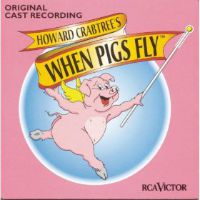 Original Off-Broadway Cast, 1997 (RCA)
Original Off-Broadway Cast, 1997 (RCA)  (2 / 5) The second of two revues that showcased the talents of outré costume designer Howard Crabtree was an evening of bright, largely gay humor. Though several of the songs by composer Dick Gallagher and lyricist-librettist Mark Waldrop are fun, the show’s real strength was visual, matching sketches to outrageously elaborate costume designs. A number called “Light in the Loafers” loses something when you don’t see dancers wearing electrified shoes; so does “Not All Man,” which was delivered onstage by David Pevsner done up as a centaur. A sketch featuring Stanley Bojarski as Carol Ann Knippel, the doyenne of a Midwest community theater, doesn’t slay on the recording the way it did live. Still, there are pleasures to be found here — many of them courtesy of Jay Rogers, who delivers a series of torch songs aimed at the right-wing ideologues Newt Gingrich, Strom Thurmond, and Rush Limbaugh. Rogers also gets the show’s best number: the touching, ruminative “Laughing Matters,” which only gains in poignancy when one knows that Crabtree died of AIDS shortly after this show opened. — David Barbour
(2 / 5) The second of two revues that showcased the talents of outré costume designer Howard Crabtree was an evening of bright, largely gay humor. Though several of the songs by composer Dick Gallagher and lyricist-librettist Mark Waldrop are fun, the show’s real strength was visual, matching sketches to outrageously elaborate costume designs. A number called “Light in the Loafers” loses something when you don’t see dancers wearing electrified shoes; so does “Not All Man,” which was delivered onstage by David Pevsner done up as a centaur. A sketch featuring Stanley Bojarski as Carol Ann Knippel, the doyenne of a Midwest community theater, doesn’t slay on the recording the way it did live. Still, there are pleasures to be found here — many of them courtesy of Jay Rogers, who delivers a series of torch songs aimed at the right-wing ideologues Newt Gingrich, Strom Thurmond, and Rush Limbaugh. Rogers also gets the show’s best number: the touching, ruminative “Laughing Matters,” which only gains in poignancy when one knows that Crabtree died of AIDS shortly after this show opened. — David Barbour
What Makes Sammy Run?
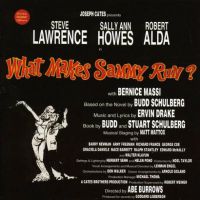 Original Broadway Cast, 1964 (Columbia/GL Music)
Original Broadway Cast, 1964 (Columbia/GL Music)  (1 / 5) Longtime theatergoers will recall that, for a brief time decades ago, Steve Lawrence was touted as the next great Broadway leading man. Exhibit A is this now-forgotten hit (540 performances), adapted by Budd Schulberg and his brother Stuart from the former’s scalding novel about Hollywood climbers. Lawrence is Sammy Glick, who rises from the position of copy boy for a New York newspaper to top Hollywood producer in record time, by any means needed. Sally Ann Howes plays a buttoned-up screenwriter with a yen for hustlers; she’s loved from afar by Robert Alda in the role of a fellow screenwriter and student of Glick. All three are fine, but they’re let down by composer-lyricist Ervin Drake’s score, which strains for ring-a-ding sophistication and doesn’t achieve it. Every number sounds like the opener of a Vegas floor show. Lawrence and Howes do well in “A Room Without Windows,” and Lawrence teams effectively with Bernice Massi, as a studio exec’s predatory daughter, in the appropriately titled “You’re No Good.” Don Walker’s generic orchestrations are no help; neither is the CD edition of the recording, released in mono by Lawrence. It was mediocre shows like this, with their derivative melodies and almost-clever lyrics, that helped bring down the curtain on Broadway’s golden age. — David Barbour
(1 / 5) Longtime theatergoers will recall that, for a brief time decades ago, Steve Lawrence was touted as the next great Broadway leading man. Exhibit A is this now-forgotten hit (540 performances), adapted by Budd Schulberg and his brother Stuart from the former’s scalding novel about Hollywood climbers. Lawrence is Sammy Glick, who rises from the position of copy boy for a New York newspaper to top Hollywood producer in record time, by any means needed. Sally Ann Howes plays a buttoned-up screenwriter with a yen for hustlers; she’s loved from afar by Robert Alda in the role of a fellow screenwriter and student of Glick. All three are fine, but they’re let down by composer-lyricist Ervin Drake’s score, which strains for ring-a-ding sophistication and doesn’t achieve it. Every number sounds like the opener of a Vegas floor show. Lawrence and Howes do well in “A Room Without Windows,” and Lawrence teams effectively with Bernice Massi, as a studio exec’s predatory daughter, in the appropriately titled “You’re No Good.” Don Walker’s generic orchestrations are no help; neither is the CD edition of the recording, released in mono by Lawrence. It was mediocre shows like this, with their derivative melodies and almost-clever lyrics, that helped bring down the curtain on Broadway’s golden age. — David Barbour
What About Luv?
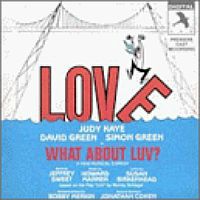 Studio Cast, 1990 (JAY) No stars; not recommended. The only reason to musicalize a play is to add something to it, to enrich the original material. But again and again in this show based on Murray Schisgal’s unique, distinctive, and uproarious 1964 comedy Luv, moments from the play are flattened out by what can only be called by-the-numbers musical theater writing. For instance, one famous scene in the play has two men comparing their miserable childhoods, each trying to prove that he had a tougher upbringing; simply putting the scene into song form robs it of most of its surprise, and about half of the original material is missing entirely. In another scene in Luv, the wife of one of the men comes on with a graph illustrating their lack of a sex life, and the no-nonsense tone of her speech is immensely funny; but composer Howard Marren and lyricist Susan Birkenhead have set the sequence as a jazz waltz, which is not only emotionally inappropriate but also makes it very difficult to understand the words. The plot point is covered, but it’s not the least bit funny anymore. Throughout, the thoroughly conventional songs sentimentalize the characters in a complete betrayal of the loopy original material. The cast of this recording includes Judy Kaye (who starred in the original Off-Broadway production) along with her husband David Green and the unrelated Simon Green. — David Wolf
Studio Cast, 1990 (JAY) No stars; not recommended. The only reason to musicalize a play is to add something to it, to enrich the original material. But again and again in this show based on Murray Schisgal’s unique, distinctive, and uproarious 1964 comedy Luv, moments from the play are flattened out by what can only be called by-the-numbers musical theater writing. For instance, one famous scene in the play has two men comparing their miserable childhoods, each trying to prove that he had a tougher upbringing; simply putting the scene into song form robs it of most of its surprise, and about half of the original material is missing entirely. In another scene in Luv, the wife of one of the men comes on with a graph illustrating their lack of a sex life, and the no-nonsense tone of her speech is immensely funny; but composer Howard Marren and lyricist Susan Birkenhead have set the sequence as a jazz waltz, which is not only emotionally inappropriate but also makes it very difficult to understand the words. The plot point is covered, but it’s not the least bit funny anymore. Throughout, the thoroughly conventional songs sentimentalize the characters in a complete betrayal of the loopy original material. The cast of this recording includes Judy Kaye (who starred in the original Off-Broadway production) along with her husband David Green and the unrelated Simon Green. — David Wolf

